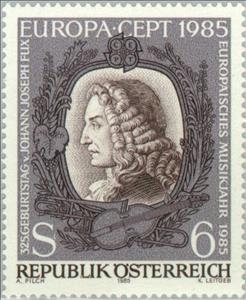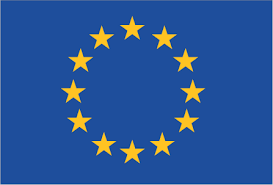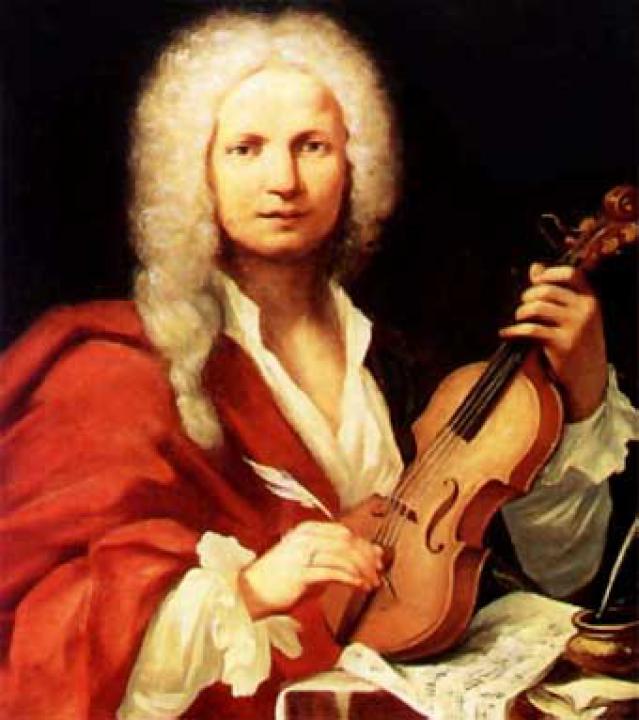Stamp: Johann Joseph Fux (1660-1741) composer & music theorist (Austria 1985)
Johann Joseph Fux (1660-1741) composer & music theorist (Austria 1985)
03 May (Austria ) within release C.E.P.T. goes into circulation Stamp Johann Joseph Fux (1660-1741) composer & music theorist face value 6 Austrian schilling
| Stamp Johann Joseph Fux (1660-1741) composer & music theorist in catalogues | |
|---|---|
| Michel: | Mi:AT 1811 |
| Yvert et Tellier: | Yt:AT 1640 |
Stamp is vertical format.
Johann Joseph Fux was an Austrian composer, music theorist and pedagogue of the late Baroque era. He is most famous as the author of Gradus ad Parnassum, a treatise on counterpoint, which has become the single most influential book on the Palestrinian style of Renaissance polyphony.Stamp Johann Joseph Fux (1660-1741) composer & music theorist it reflects the thematic directions:
The European Union (EU) is a supranational political and economic union of 27 member states that are located primarily in Europe.The Union has a total area of 4,233,255 km2 (1,634,469 sq mi) and an estimated total population of over 448 million. The EU has often been described as a sui generis political entity (without precedent or comparison) combining the characteristics of both a federation and a confederation
Music is an art form and cultural activity whose medium is sound organized in time. The common elements of music are pitch (which governs melody and harmony), rhythm (and its associated concepts tempo, meter, and articulation), dynamics (loudness and softness), and the sonic qualities of timbre and texture (which are sometimes termed the "color" of a musical sound). Different styles or types of music may emphasize, de-emphasize or omit some of these elements. Music is performed with a vast range of instruments and vocal techniques ranging from singing to rapping; there are solely instrumental pieces, solely vocal pieces (such as songs without instrumental accompaniment) and pieces that combine singing and instruments. The word derives from Greek μουσική (mousike; "art of the Muses"). In its most general form, the activities describing music as an art form or cultural activity include the creation of works of music (songs, tunes, symphonies, and so on), the criticism of music, the study of the history of music, and the aesthetic examination of music. Ancient Greek and Indian philosophers defined music as tones ordered horizontally as melodies and vertically as harmonies. Common sayings such as "the harmony of the spheres" and "it is music to my ears" point to the notion that music is often ordered and pleasant to listen to.
The European Conference of Postal and Telecommunications Administrations (CEPT) was established on June 26, 1959, as a coordinating body for European state telecommunications and postal organizations. The acronym comes from the French version of its name Conférence européenne des administrations des postes et des télécommunications.
The Europa postage stamp (also known as Europa - CEPT until 1992) is an annual joint issue of stamps with a common design or theme by postal administrations of member countries of the European Communities (1956-1959), the European Conference of Postal and Telecommunications Administrations (CEPT) from 1960 to 1992, and the PostEurop Association since 1993. Europe is the central theme. EUROPA stamps underlines cooperation in the posts domain, taking into account promotion of philately. They also build awareness of the common roots, culture and history of Europe and its common goals. As such, EUROPA stamp issues are among the most collected and most popular stamps in the world. Since the first issue in 1956, EUROPA stamps have been a tangible symbol of Europe’s desire for closer integration and cooperation.
A composer is a person who writes music. The term is especially used to indicate composers of Western classical music, or those who are composers by occupation. Many composers are, or were, also skilled performers of music.





